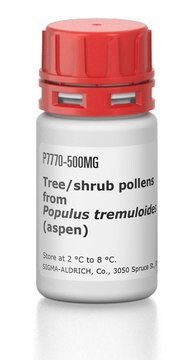Recommended Products
Application
Lycopodium has been used as a hydrophobic coating on liquid marbles to make them non-adhering. It can be used as a pore-forming agent for the synthesis of porous hydroxyapatite and alumina ceramics.
Signal Word
Danger
Hazard Statements
Precautionary Statements
Hazard Classifications
Flam. Sol. 1
Storage Class Code
4.1B - Flammable solid hazardous materials
WGK
WGK 3
Flash Point(F)
Not applicable
Flash Point(C)
Not applicable
Personal Protective Equipment
dust mask type N95 (US), Eyeshields, Gloves
Choose from one of the most recent versions:
Already Own This Product?
Find documentation for the products that you have recently purchased in the Document Library.
Elasticity and failure of liquid marbles: influence of particle coating and marble volume.
Rendos A, et al.
Soft Matter, 13(47), 8903-8909 (2017)
The lycopodium alkaloids.
W A Ayer
Natural product reports, 8(5), 455-463 (1991-10-01)
[Coating assays of a granulate containing lycopodium oil (author's transl)].
R Renoux et al.
Journal de pharmacie de Belgique, 36(2), 97-102 (1981-03-01)
Jing-Shi Xue et al.
Molecular plant, 13(11), 1644-1653 (2020-08-19)
The outer wall of pollen and spores, namely the exine, is composed of sporopollenin, which is highly resistant to chemical reagents and enzymes. In this study, we demonstrated that phenylpropanoid pathway derivatives are essential components of sporopollenin in seed plants.
Porous alumina ceramics produced with lycopodium spores as pore-forming agents.
Zivcova Z, et al.
J. Mater. Sci., 42(20), 8760-8764 (2007)
Our team of scientists has experience in all areas of research including Life Science, Material Science, Chemical Synthesis, Chromatography, Analytical and many others.
Contact Technical Service







